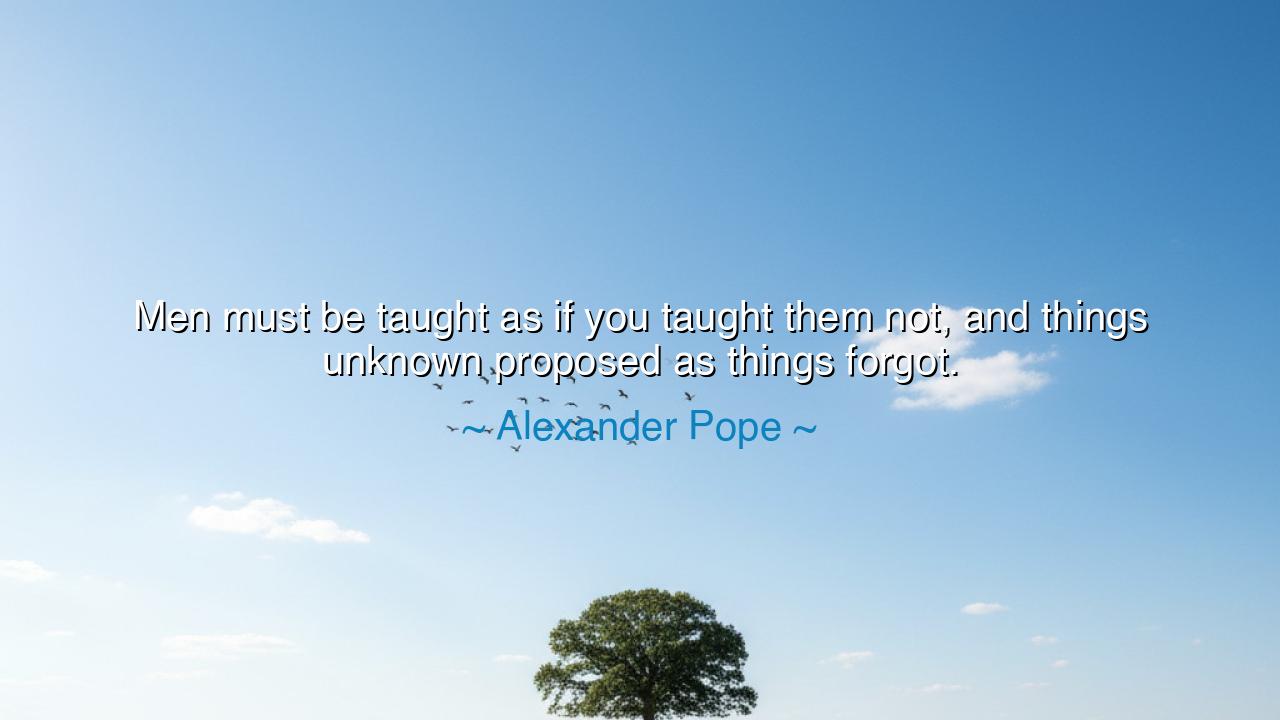
Men must be taught as if you taught them not, and things unknown
Men must be taught as if you taught them not, and things unknown proposed as things forgot.






"Men must be taught as if you taught them not, and things unknown proposed as things forgot." These words, spoken by the brilliant poet Alexander Pope, touch on a profound aspect of the teaching process—the importance of subtlety, humility, and respect for the learner’s own understanding. In this statement, Pope advocates for an approach to education that does not impose knowledge upon the learner in an authoritative or forceful way, but instead presents it in a manner that allows the mind to grasp and absorb it freely. To teach is not to dominate, but to guide, to nudge the learner toward self-discovery, so that learning feels like a natural extension of their own thinking, rather than an imposition.
In the ancient world, Socrates embodied this philosophy. He would engage his students through the Socratic method, a technique of questioning that encouraged critical thinking rather than lecturing. Socrates knew that to truly educate someone, it was not enough to simply impart facts or ideas. One must allow the learner to discover the truth for themselves, for knowledge that comes from within is far more powerful than that which is forced from without. Socrates would often say that he was not teaching his students, but rather guiding them to the truths that they already held within themselves. He understood that true education required a delicate balance between instruction and freedom, where the teacher is more of a companion than a dictator.
Pope’s statement also reflects the teachings of Plato, who in his dialogues often portrayed Socrates as someone who "taught" without seeming to do so. Plato’s Republic, for example, describes an ideal education in which knowledge is not simply handed down from teacher to student, but is drawn out of the student, as if by a process of discovery. The teacher must propose new ideas and concepts, but in such a way that the student believes they have come to these realizations on their own. This, Plato believed, was the highest form of learning. For Pope, the most effective way to teach was to make the learner feel as though they were not being taught at all, but instead were simply remembering or recovering knowledge that had been forgotten—thus, engaging the learner’s intuition and curiosity rather than imposing something foreign onto them.
The idea of teaching as if you are not teaching also echoes the ancient wisdom of Confucius, who believed that a true teacher must be a model of virtue and integrity, not someone who simply speaks and instructs, but someone whose very life serves as an example. Confucius taught that a teacher should allow students to learn by example and experience, rather than through rigid instruction. He said, “When we see men of a contrary character, we should turn inwards and examine ourselves." For Confucius, learning was not just an intellectual activity but a moral and personal one, and it was best cultivated through reflection, guidance, and example. Much like Pope’s philosophy, Confucius understood that the greatest lessons often come when the learner is left to reflect and come to their own conclusions, not simply to absorb facts passively.
In more modern history, this subtle approach to teaching can be seen in the methods of Maria Montessori, a renowned educator who revolutionized early childhood education. Montessori believed that children learn best when they are allowed to explore and discover on their own, with minimal interference from the teacher. Her classrooms were designed to give children the freedom to engage with the world around them, with materials and environments that stimulate curiosity and problem-solving. Like Pope and the ancient philosophers, Montessori understood that true learning is not forced, but is instead an act of discovery, one that must arise naturally from within the child’s own experiences.
The lesson that Pope imparts to us is a powerful one: education is not about dictating facts and ideas to others, but about guiding them to uncover those truths themselves. True learning is an act of discovery, not imposition. It requires a deep respect for the learner’s own intelligence and intuition, and it thrives in an environment where ideas are proposed, not as imperatives, but as invitation to engage. When we approach teaching in this way, we do not simply transfer knowledge—we empower others to think critically and independently, to challenge assumptions, and to form their own conclusions.
In your own life, seek to embody this approach in your interactions with others, whether you are teaching or learning. When you seek to impart knowledge, do not approach it with the mindset of imposing information, but as an opportunity to open up a space for others to think, reflect, and discover. Whether you are parenting, mentoring, or simply conversing, invite others to explore their own thoughts and ideas, allowing them to come to their own conclusions. In doing so, you will not only foster genuine learning, but also build relationships based on respect, understanding, and shared growth. Remember, the most powerful knowledge is the one we discover for ourselves.






AAdministratorAdministrator
Welcome, honored guests. Please leave a comment, we will respond soon